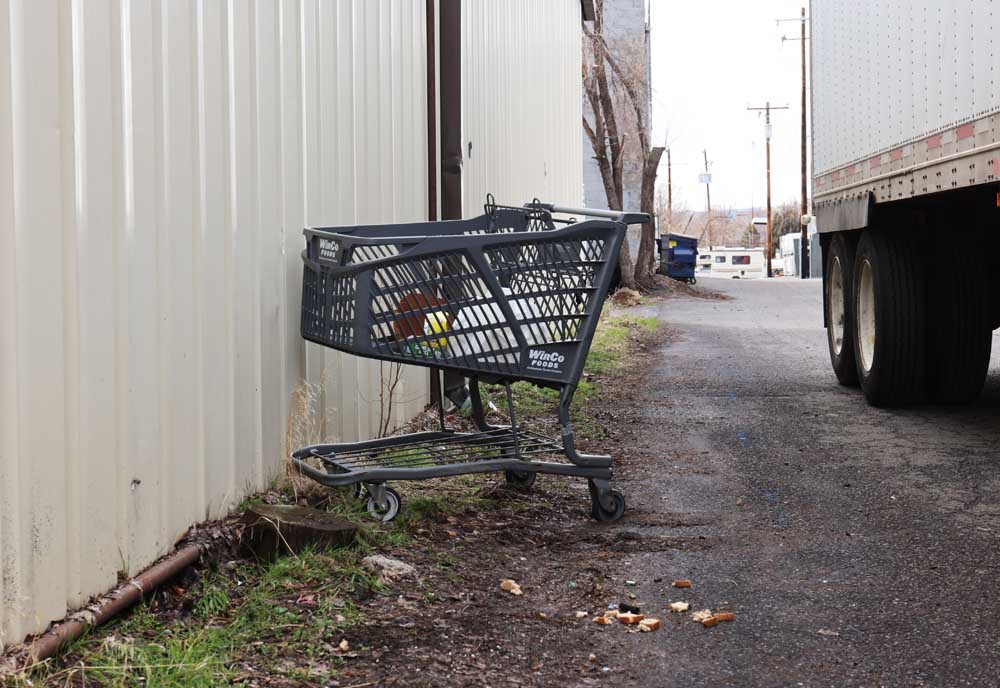Madras wanted to fine grocery stores for having their shopping carts stolen. Retailers pushed back
Published 8:30 am Wednesday, February 28, 2024

- A WinCo Foods shopping cart abandoned in an alleyway more than 2 miles away from the Bend store. The city of Madras considered a proposal to fine retailers who had their shopping carts stolen — until retailers pushed back.
MADRAS — The city of Madras proposed fining retailers $100 for having their shopping carts stolen from them, but grocery stores and some community members pushed back Monday, leading the city to scrap the idea entirely.
The ordinance attempted to crack down on an increasing number of shopping cart thefts, and, ultimately, address visible signs of homelessness in the city. Officials said Monday they tend to retrieve carts from people living in the city’s two designated camping areas.
However, retailers agreed the proposed regulations didn’t make much sense.
“We’ve got to find a better solution than fining the victims of crime,” John Weiss, the owner and operator of the Grocery Outlet Bargain Market in Madras, said Monday.
The proposed regulations also suggested charging retailers an additional $50 to reclaim their shopping carts.
Nick Snead, the city’s community development director, hosted an open house Monday to garner community feedback on the regulations. Representatives from each grocery store in town attended, along with local officials and community members.
“The shopping carts aren’t necessarily creating this problem,” Snead said at the open house. “I think we can all agree on that.”
A solution to homelessness in Central Oregon? A first of its kind apartment building
Snead called the city’s shopping cart issue a symptom of homelessness in an interview with The Bulletin days before the open house.
Regardless, community members and retailers didn’t agree with burdening grocery stores with fines.
The city of Madras hired a code enforcement officer in October, and since then, shopping carts have become a major point of focus among city staff. The officer retrieved an estimated 243 shopping carts belonging to five different grocery stores between Oct. 25 and Jan. 22, according to city documents.
More Coverage
How Central Oregon spent $14.7 million in state funds to fight homelessnes
A large portion of the carts belonged to Safeway, according to the documents.
Bend and Redmond treat shopping cart thefts like any other theft. Because of their price point — around $200 a piece, estimated Sheila Miller, a spokesperson for the Bend Police Department — stealing a shopping cart could qualify as second-degree theft.
Bend Police rarely receive calls about stolen shopping carts, if ever, Miller said. Eric Beckwith with the Redmond Police Department concurred. Since 2003, Redmond Police have received only 35 shopping cart-related theft reports, he said.
After Madras officials decided to discard the proposed regulations before the meeting’s end, a number of alternative solutions came up. Among them, implementing wheel locking systems on carts once they are taken a certain distance from the store and offering personal, foldable carts to people who might need them.
Addressing homelessness in small-town Oregon
Oregon cities have struggled to regulate homelessness in recent years with contingencies from state law and federal court cases taking priority.
A 2018 court case, Martin v. Boise, bars governments within the states covered by the 9th U.S. Circuit Court of Appeals — Alaska, Arizona, California, Hawaii, Idaho, Montana, Nevada, Oregon and Washington — from enforcing certain restrictions on sleeping in public if shelter beds are unavailable. The 9th Circuit also includes Guam and the Northern Mariana Islands, which are U.S. territories.
“We can make it inconvenient as long as they have another place to go,” Jefferson County Fire & EMS Chief Jeff Blake said at Monday’s open house.
An estimated 51 people are homeless on a given night in Madras, according to the 2023 Point in Time Count.
The Madras City Council approved regulations for homelessness in June 2023 that made it illegal for people to camp on all city property during most daylight hours save for two designated areas. Officials have yet to fully enforce those regulations because of a lack of permanent shelter beds in town. A permanent shelter opened in January, so Snead said the city plans to gradually introduce those regulations this year.
Read more of The Bulletin’s latest coverage of homelessness in Central Oregon








